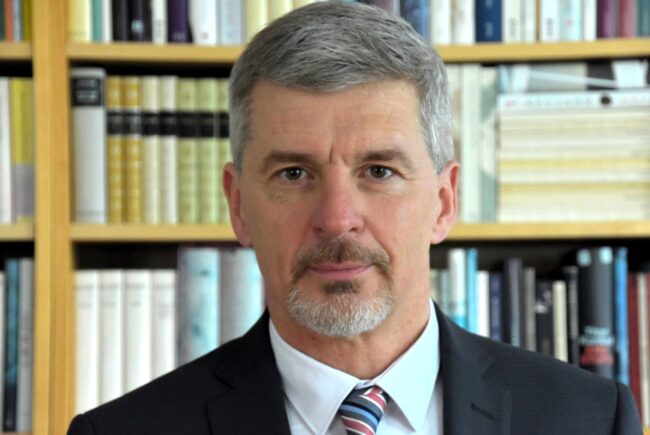

“Pluralism and subsidiarity are essential principles of continuing education and its political governance,” Thomas Jung states. These principles are important for making continuing education relevant, inclusive and adaptable to the needs of different learners and communities.
EDITORIAL Politics, policy and practice: Navigating the challenges of continuing education
Published:“Pluralism and subsidiarity are essential principles of continuing education and its political governance,” Thomas Jung states. These principles are important for making continuing education relevant, inclusive and adaptable to the needs of different learners and communities.
In his editorial on the theme of Policy and Practice, ELM Editorial Board member Thomas Jung raises important questions about the relationship between the two. How do political changes impact continuing education? When is a continuing education policy considered successful?
POLITICS IS CHARACTERISED by the fact that it affects everyone. It determines the fundamental and generally binding framework conditions for our social coexistence.
In the understanding of statecraft, continuing education is a rather young political field. For a long time, adult and continuing education was considered to be remote from the state, as it developed primarily in social subsystems and subgroups or through the initiatives of individual interest groups. Pluralism and subsidiarity are therefore still essential principles of continuing education and its political governance.
In the 20th century, various European nation states took different approaches to making adult and continuing education a state or societal responsibility. It was and is always a question of the will and ability of the state or society. Also, the EU plays an essential role in shaping the current landscape of adult education in Europe.
Adult and continuing education depends on the will and capacity of the state.
The area of continuing education must always be seen in relation to other areas of education, which adult and continuing education complements in terms of lifelong learning.
In the development towards a digital, socially just and climate-neutral society, strategies and measures are needed above all to secure the demand for skilled workers, to strengthen the innovative power and competitiveness of the economy and to develop individual – and professional – development potential. Adult and continuing education plays a central role in this.
DEPENDING ON THEIR HISTORY, continuing education systems are political arenas in which a large number of relatively autonomous players operate at different levels with different interests and different management intentions.
In Germany, continuing education is anchored in legal acts on continuing education in the federal states. In 2019, a National Strategy for Continuing Education and Training was adopted for the first time and presented in an updated version just three years later. This strategy strengthens the political commitment to concrete measures for the further development of the continuing education system and for strengthening the culture of continuing education. One major goal is to raise participation in continuing education up to 65 %.
The strategic concept was followed by a National Continuing Education Conference in 2023, which enriched the strategic objectives of the policy in a professional discourse with further expertise from practice and strengthened the exchange and networking of the partners with external stakeholders.
HOWEVER, ADULT AND CONTINUING education is also subject to the ebb and flow of political cycles, the complexities of the situation, and, in the most challenging of circumstances, the constraints of legislative periods.
What effects can political changes following elections and changes of government have on continuing education? How much continuity can adult and continuing education maintain, even in the face of such changes?
Adult and continuing education may be subject to political cycles.
Or is the plurality of providers and players in continuing education and their rootedness in society not also an opportunity for relative autonomy, as education has claimed for itself since the Enlightenment?
THE TENSION BETWEEN policy and practice in continuing education creates many questions.
What measures at the level of political control can be found? What effects does policy have on the actions of those involved in continuing education?
When is continuing education policy considered successful? What can policymakers and other continuing education stakeholders do to ensure that continuing education policy is successful?
When is a continuing education policy considered successful?
Can continuing education and adult learning be the answer to the risks of unfairly distributed educational and life opportunities?
Can continuing education and adult learning provide answers to the new risks associated with social developments and major upheavals in the world of work?
What are the conducive framework conditions for successful continuing education that can be set by politicians? This concerns far more than the state financing of the continuing education system, which is generally subject to market-based mechanisms and is not regulated and financed by the state like the school system.
Questions about the relationship between policy and practice are addressed in ELM Magazine from October to December. In engaging interviews by Wif Stenger, EAEA’s Uwe Gartenschlaeger and ICAE’s Robbie Guevara discuss the power of advocacy work and partnering needed in adult education policy. Regarding concrete measures, we interview Paolo Federighi from the University of Florence to explore challenges of implementing micro-credentials and strategies to overcome them.
Enjoy the articles and stay tuned for more insightful content.

Looking for more articles on the relationship between policy and practice?
This article is part of the theme 'Policy and Practice 2024'.
Read related articles hereAuthor







